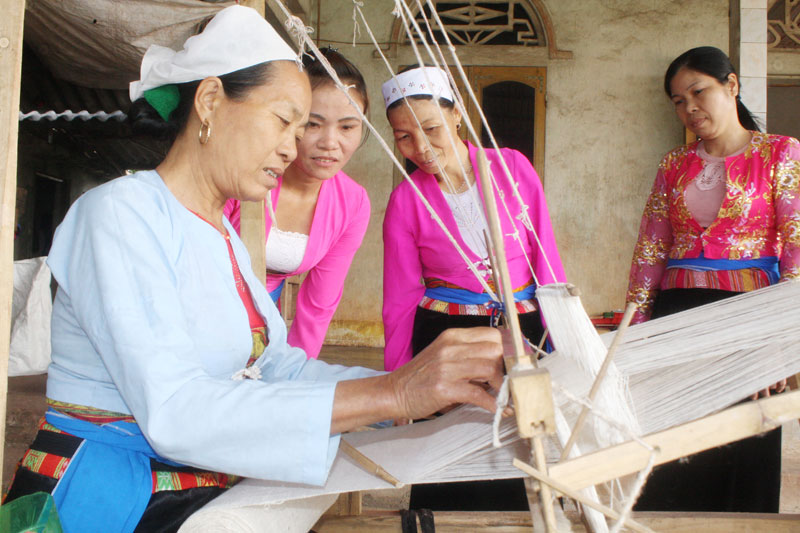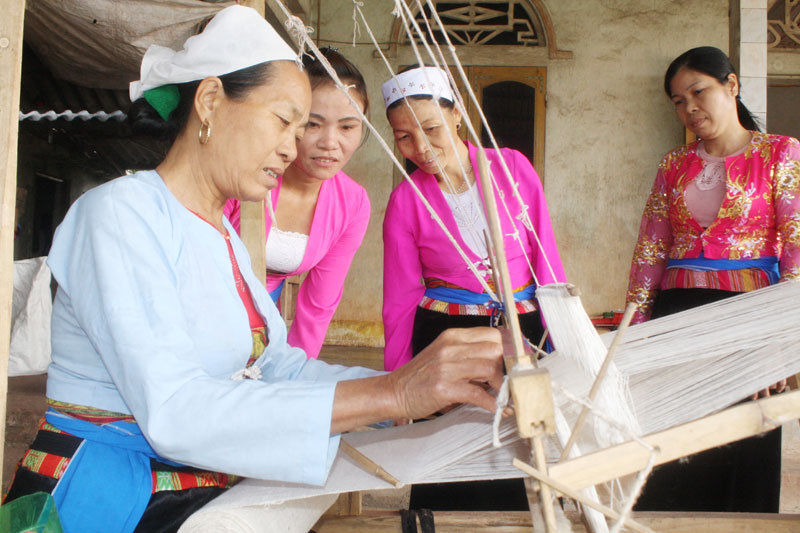
(HBO) - Muong village is a traditional brocade weaving village in Com hamlet, Dong Lai commune, Tan Lac district

Weaving has become the daily work of the female people in Co hamlet, Dong
Lai commune (Tan Lac) during idle time.
More than 10 years ago, the craft of weaving brocade in the village
gradually died out, some people even removed the loom to make firewood. But
now, weaving cloth in free time has become a favorite work and brought a lot of
money for many women. Ms. Bui Thi Mia, who is considered as the village chief
of Co hamlet, says that since Vong Ngan cooperative received the support to
restore the, there have been about 80 looms in Com hamlet now. There are
products to sell to customers at any time of the year.
The time to weave the raw cloths, colorful brocade skirts can’t be counted
by days or months, it may take a year. According to Ms. Bui Thi Yen in Co
hamlet, Muong women have to go through about 20 stages to weave a cloth. The
first is growing cotton, taking care for it for about six months to harvest.
After being picked home, cotton must go through more than ten stages to become
the thread. Then from that they put the threat into the loom and it takes about
half a year to create a skirt waistband and skirt legs if working hard enough.
Ms. Bui Thi Mia adds "Currently, although there is a competition with
the brocade products woven by machines, we still work hard to create handmade
products that are both beautiful and meet the customers’ needs. In recent
years, the consumption of the products has mainly been through trade fairs and
festivals at the beginning of the New Year. Although it does not bring a high
income, but weaving helps women improve their lives".
In order to meet the needs of the market and improve competitiveness, women
in Com hamlet have discovered and created new products such as bags and scarves
with eye-catching patterns. With the love for traditional weaving, eighty looms
are being woven every day. They believe that if the product is widely
advertised, Muong patterns will stretch further and further, bringing warmer
springs for Muong village.
With an increasingly vibrant and widespread emulation movement aimed at building cultured residential areas and cultured families, Yen Thuy District has been making steady progress toward improving both the material and spiritual well-being of its people, while fostering a civilized, prosperous, beautiful, and progressive community.
Once lacking recreational spaces and community facilities, Residential Group 2 in Quynh Lam Ward (Hoa Binh City) has recently received attention for the construction of a new, spacious, and fully equipped cultural house. The project followed the model of state support combined with public contributions in both labor and funding.
The "All people unite to build cultural life" movement, which has been effectively integrated with Kim Boi district’s socio-economic development goals, is fostering a lively spirit of emulation across local residential areas, hamlets, villages, public agencies, and enterprises. In addition, through the initiative, traditional cultural values are being preserved and promoted, while community solidarity and mutual support in poverty reduction and economic development are being strengthened.
A working delegation of the Hoa Binh provincial People’s Committee led by its Permanent Vice Chairman Nguyen Van Toan on June 11 inspected the progress of a project to build the Mo Muong Cultural Heritage Conservation Space linked to tourism services in Hop Phong commune, Cao Phong district.
Born and growing in the heroic land of Muong Dong, Dinh Thi Kieu Dung, a resident in Bo town of Kim Boi district, in her childhood was nurtured by the sweet lullabies of her grandmother and mother. These melodies deeply imprinted on her soul, becoming an inseparable part of her love for her ethnic group's culture. For over 20 years, this love for her hometown has driven Dung to research, collect, and pass down the cultural values of the Muong people to future generations.
In the final days of May, the Ethnic Art Troupe of Hoa Binh Province organized performances to serve the people in remote, mountainous, and particularly disadvantaged areas within the province. These were not just ordinary artistic shows, but they were the meaningful journeys aimed at spreading cultural values, enhancing the spiritual life of the people and contributing to the preservation of ethnic minority cultural identities.



